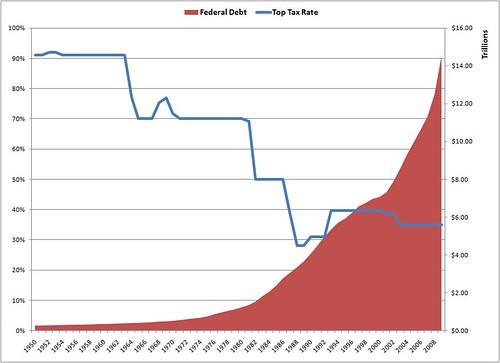Serious People were saying that budget deficits hurt the economy. Then we increased taxes on the rich so now deficits are wayyyyy down. So Serious People are saying that taxes hurt the economy. Or is it spending on schools and infrastructure that is going to kill the economy. Wait, it's the new health care law -- millions of people getting coverage is going to kill the economy. How come Serious People never complain that cutting schools, infrastructure maintenance, Social Security, scientific research (and other things We the People spend money on to make our lives better) really, actually does hurt the economy?
The Record On Taxes And Economic Growth
Last year the Congressional Research Service (CRS) took a look at the actual record of taxes and economic growth and issued a report, Taxes and the Economy: An Economic Analysis of the Top Tax Rates Since 1945. The report reported,
Throughout the late-1940s and 1950s, the top marginal tax rate was typically above 90%; today it is 35%. Additionally, the top capital gains tax rate was 25% in the 1950s and 1960s, 35% in the 1970s; today it is 15%. The real GDP growth rate averaged 4.2% and real per capita GDP increased annually by 2.4% in the 1950s. In the 2000s, the average real GDP growth rate was 1.7% and real per capita GDP increased annually by less than 1%. There is not conclusive evidence, however, to substantiate a clear relationship between the 65-year steady reduction in the top tax rates and economic growth. Analysis of such data suggests the reduction in the top tax rates have had little association with saving, investment, or productivity growth. However, the top tax rate reductions appear to be associated with the increasing concentration of income at the top of the income distribution. The share of income accruing to the top 0.1% of U.S. families increased from 4.2% in 1945 to 12.3% by 2007 before falling to 9.2% due to the 2007-2009 recession. The evidence does not suggest necessarily a relationship between tax policy with regard to the top tax rates and the size of the economic pie, but there may be a relationship to how the economic pie is sliced.
Translation from government to English: The top tax rate used to be over 90% and capital gains taxes used to be much higher. At that time economic growth was much higher. Then they dramatically lowered tax rates for the rich and economic growth went waaaaay down. (However, they can't say for sure that cutting taxes on the rich caused the huge drop in economic growth.) Also the tax cuts didn't boost saving, investment or productivity growth. BUT the rate-lowering appears to have caused incomes to concentrate at the top, which has screwed and squeezed the rest of us.
And, by the way, the tax cut did cause massive deficits and we stopped maintaining and modernizing our infrastructure, cut back on education, universtities, scientific research, space exploration, medical research and so many other things that We, the People do to make our lives better.
You might not have heard about this study. Senate Republicans made the CRS withdraw the report.
Here is a chart I made some time ago, for the post, Conservative Tax Tricks – Did Tax Cuts Grow The Economy?
Trend line of growth, with top tax rates:

And as long as we're looking at that post, this was also in there, top tax rates and national debt:
Similar Claims, Same Results
Republican claims that taxes hurt the economy go hand-in-hand with similar Republican anti-government claims. The claims usually amount to "government is in the way," "government hurts the economy," "government spending is bad," etc. A Google search of "government is in the way" finds many, many examples, including:
Government the Job Killer - John Stossel. In this one Stossel claims that building infrastructure is bad for the economy. "Building giant government projects is no way to create jobs. When government spends on infrastructure, it takes money away from projects that consumers might think are more important." He actually claims that building the transcontinental railroad was a bad deal for the country.
A post at Noahpinion has been circulating around the economics blogs, Conservative economic arguments since the crisis: A review. The post looks at a number of Republican economic arguments of late, finding them all to be either mostly or completely ... well ... rubbish. Examples include "Fannie, Freddie, and possibly the CRA caused the crisis." and "Welfare is the main force prolonging the recession, by discouraging people from working."
And of course never forget, "Nothing is more important in the face of a war than cutting taxes." - Tom DeLay, House Republican leader, 2003.
Why do we listen to these clowns at all? (Because they are backed by the big, big money people who get all the money that come from these Republican schemes.) Why don't we just create millions of jobs by investing in infrastructure and similar projects? Why don't we just restore a top tax rate of 90% and a top corporate tax rate of 50%? Why don't we boost capital gains taxes? Does it have something to do with the influence of money over politics?


